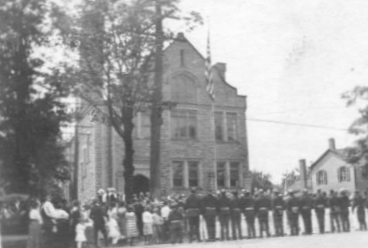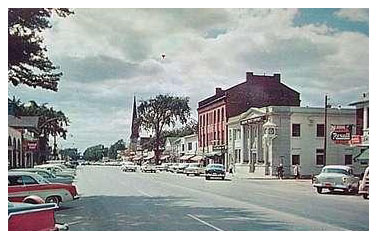Village
of Williamsville Code
Previous Chapter | Table of Contents | Next Chapter
Chapter 78: Sewer
Rents
§ 78-1. Purpose.
§ 78-2. Rents established.
§ 78-3. Collection.
§ 78-4. Conflict
with other provisions.
[HISTORY: Adopted by
the Town Board of the Town of Williamsville 1-14-1991 as L.L. No. 2-1991.
Amendments note where applicable.]
GENERAL REFERENCES
Sewer use -- See Ch.
81.
§ 78-1. Purpose.
The purpose of this chapter
is to establish and impose sanitary sewer rents, pursuant to Article 14-F
of the General Municipal Law the State of New York, on all properties located
within one hundred fifty (150) feet of a sanitary sewer and all properties
outside village where the village has contracted to provide sanitary sewer
services.
§ 78-2. Rents established.
A. The sanitary sewer rents
for properties located within village corporate limits shall be established
annually by resolution of the Board of Trustees after a public hearing.
B. Properties located
outside the village corporate limits which are connected to the village
sanitary sewer system shall pay an annual sewer rent as established by
resolution of the Board of Trustees after a public hearing.
C. Properties shown on
the Village Map as unimproved land shall pay a sewer rent based on an annual
rate per one thousand dollars ($1,000.) of value.
D. For all other properties
in the village subject to the payment of sanitary sewer rents, a scale
of charges shall be established by resolution of the Board of Trustees
in accordance with the following:
(1) That part of the
total cost attributed to operation and maintenance costs shall be based
upon the volume of water consumed. That part of the total cost attributed
to capital costs shall be based upon the total value of the premises connected
with and served by the sewer system.
(2) Any nongovernmental
user of the sanitary sewer system which discharges more than twenty-five
thousand (25,000) gallons per day (gpd) of sanitary waste or a volume of
process waste or a combined process and sanitary waste having a weight
of biochemical oxygen demand (BOD) or suspended solids equivalent to that
weight found in twenty-five thousand (25,000) gallons per day of sanitary
waste shall be classified as an industrial commercial user. Each such user
shall pay its proportionate share of operation and maintenance costs of
the sanitary sewer system based upon its proportionate contribution to
the total wastewater loading from all classes of users. Such contribution
shall be based on factors such as strength, volume and delivery-flow rate
characteristics.
(3) Industrial, institutional
or commercial property whose water supply is not exclusively provided by
the village water system but which is connected to the sewer system may,
at the discretion of the village, be required to install and maintain a
meter or other suitable device, at the expense of the owner, subject to
the approval of the village, for the purpose of measuring the amount of
sewage discharged into the village sanitary sewer system.
(4) Any user that discharges
any toxic pollutants that result in any increase in the cost of managing
the effluent or the sludge of the local treatment works shall be classified
as an industrial/commercial user and be required to pay the amount of such
increased costs.
§ 78-3. Collection.
A. Sanitary sewer rents
shall be due and payable at the same time and in the same manner as general
village taxes and shall be included therein.
B. Sanitary sewer rents
not paid when due, plus penalties and interest, shall become a lien on
the real property to which unpaid rents were charged and shall be added
to the next succeeding county property tax bill.
C. Interest and penalties
shall be levied in the same manner as interest and penalties on the village
taxes.
D. The Board of Trustees
may direct that an action be brought to any court of competent jurisdiction
for the collection of sanitary sewer rents, penalties and interest.
§ 78-4. Conflict with
other provisions.
In the case of any possible
preexisting agreements which address the reservation of capacity in the
local treatment plant or the charges to be collected by the village in
providing wastewater treatment services, transporting services or reserving
capacity, the system outlined herein for the establishment and collection
of sanitary sewage rents shall take precedence over any terms or conditions
or agreements or contracts between the grantee and users, including industrial
users, special districts, other municipalities, federal agencies or installations,
which are inconsistent with the requirements of Section 204(b)(1)(A) of
the Clean Water Act of 1977 and the rules and regulations contained in
40 CFR Part 35, Subpart E (Grants Construction of Treatment Works, Clean
Water Act).
Previous Chapter | TOP | Table of Contents | Next Chapter

|
A picture of 5583 Main St Village Hall pictured in 1949 was originally built with limestone mined from the Young's limestone quarry which occupied what is now The Country Club of Buffalo. click here to see a bigger picture.
|

|
A picture of Main St looking West taken in 1950. The Ronecker building on the right is now home to Marty's formal wear. Picture courtesy of Dan Crapsi. click here to see a bigger picture.
|
Click Here to see more pictures
 |
 |



